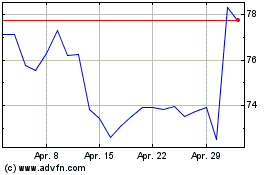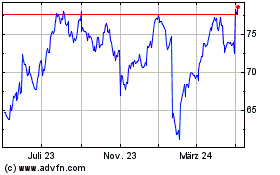By Jacob Bunge, David Benoit and Chelsey Dulaney
Dow Chemical Co. and DuPont Co. announced a merger that would
fuse two stalwarts of American industry into a giant worth about
$130 billion and would reshape the chemical and agricultural
industries.
The combined company would have $93 billion in total revenue,
based on 2014 numbers, and products ranging from corn seeds to
Kevlar fiber to foam chemicals used in sneaker soles. That behemoth
would serve as a vehicle for cutting some $3 billion in costs
before splitting into three separate businesses 18 to 24 months
after the merger closes. Those companies, each to be publicly
traded, would focus on agriculture, material sciences and specialty
products in nutrition and electronics.
The union, if approved, would mark the end as independent
entities of two of America's oldest corporations: DuPont, founded
in 1802, and Dow, started in 1897. Both are contending with sinking
commodity prices and a strengthening U.S. dollar that have
pressured their revenue. And each has sought separately in recent
years to reinvent itself as a maker of more-profitable products
while facing pressure from major investors agitating for faster,
bolder moves.
Executives billed the deal as a merger of equals. They said it
would spawn a trio of companies that are bigger and more focused,
and therefore better able to navigate current challenges. They also
emphasized that the combination and restructuring would avoid
taxes, adding to the benefit for shareholders.
The deal "was always in front of us to get done, in the right
way," Dow Chief Executive Andrew Liveris, who has long pursued a
tie-up with DuPont, said in an interview. "We believe this is the
right way."
He will be executive chairman of the new company, with DuPont
Chief Executive Edward Breen keeping the CEO title upon
consummation of a deal, anticipated by late next year. The company,
dubbed DowDuPont, will have dual headquarters in Midland, Mich.,
and Wilmington, Del. The leadership and location of the three
eventual companies hasn't been decided.
Some farm groups reacted with concern, fearing that
consolidation among the six global companies that sell crop seeds
and pesticides would leave the industry with too much clout. The
combined company would sell about 41% of U.S. corn seeds and
related genetics, for example.
The National Farmers Union said that having just five major
players "would almost certainly increase the pressure for remaining
companies to merge, resulting in even less competition, reduced
innovation and likely higher costs for farmers."
"It's time for federal regulators to remember that bigger isn't
always better and that the economic power of our nation was built
on the concept of having many players in the marketplace competing
for customers and driving innovation," said the group's president,
Roger Johnson.
The National Corn Growers Association said it would study the
merger's likely impact on agricultural research, grain pricing, and
the cost of seeds and pesticides, and "will do all we can to
protect farmer interests and preserve an open and competitive
marketplace."
"DuPont and Dow are two titans of American industry and the
proposed merger demands serious scrutiny," said Senate Judiciary
Committee Chairman Chuck Grassley, a Republican from the Farm Belt
state of Iowa.
Antitrust specialists also expect the deal to face close
examination. But Dow and DuPont executives said they didn't
anticipate big hurdles. Mr. Breen said in the interview that the
companies plan to divest only minor pieces of their businesses "but
nothing that would move the needle." Mr. Liveris said planned cost
reductions wouldn't "hobble" the companies' research
capabilities.
Friday's announcements will include major job cuts. DuPont on
Friday said that even before the merger, it plans to cut about 10%
of its global workforce. Further reductions are likely as the
combined company streamlines ahead of its planned breakup.
DuPont shares fell 5.1% in New York afternoon trading, as it
also issued downbeat comments on its expected 2016 sales growth.
Dow shares dropped 2%. Shares in both companies had risen since The
Wall Street Journal reported on Tuesday that they were in merger
talks.
A deal would be one of the biggest in a year marked by big
deals. So far, companies have struck some $4.4 trillion of
takeovers in 2015, eclipsing 2007 as the top year on record for
deals, according to Dealogic.
Shareholders of Dow Chemical will get 1 share in the new
DowDuPont for each Dow share, while DuPont shareholders will get
1.282 shares for each DuPont share. The structure will give Dow and
DuPont shareholders equal stakes in the combined company, excluding
the impact of preferred shares.
Mr. Breen, who joined DuPont's board early last year and took
over in October, said in an interview that Mr. Liveris called him
on Mr. Breen's first day running DuPont. Mr. Breen said pursuing a
merger was helped by the companies' almost equal market value.
"That always makes for quicker, easier negotiation," Mr. Breen
said.
He said merging with Dow and then breaking into three units is
far preferable to a split of DuPont by itself, a path proposed in
late 2014 by activist investment firm Trian Fund Management LP.
Friday's deal is "a totally different scenario," Mr. Breen
said.
"We've created three leading, strategic platforms, instead of
splitting DuPont into three small pieces," he said.
Trian, which owns a major stake in DuPont and unsuccessfully
pressed for board seats in a proxy fight earlier this year, said it
"fully supports this transformative transaction and believes that
the combination of DuPont and Dow is a great outcome for all
shareholders."
The New York investment firm said it was approached by the
companies to "assist in negotiations," including on structure and
governance of the combined entity and the planned spinoffs.
DowDuPont's board is to have 16 members, half from each side.
The two companies will choose those directors over the next four to
five months, and will likely hire new directors to serve on
advisory boards set up to help plan the three eventual
spinoffs.
Mr. Breen told analysts that the three-way breakup would likely
be a one-off event, rather than spinning off the units at different
times.
Mr. Liveris said there will "almost certainly" be a new leader
of the materials company, which could keep the Dow name after it is
spun out. "I do want to eventually go to the place where the future
of the company is not just beholden to my presence," he said on the
conference call.
Dow and DuPont said they would reshape their businesses ahead of
the merger. DuPont said it would cut $700 million in costs in 2016,
causing an expected pretax charge of $780 million. DuPont said it
expects sales growth next year to be "challenging."
Dow said it would take full ownership of Dow Corning Corp.,
which it jointly owns with Corning Inc. Dow said it expects that
move to yield more than $1 billion in annual earnings before
interest, taxes, depreciation and amortization. That transaction is
slated to close by the first half of 2016.
Write to Jacob Bunge at jacob.bunge@wsj.com, David Benoit at
david.benoit@wsj.com and Chelsey Dulaney at
Chelsey.Dulaney@wsj.com
(END) Dow Jones Newswires
December 11, 2015 14:43 ET (19:43 GMT)
Copyright (c) 2015 Dow Jones & Company, Inc.
DuPont de Nemours (NYSE:DD)
Historical Stock Chart
Von Jun 2024 bis Jul 2024

DuPont de Nemours (NYSE:DD)
Historical Stock Chart
Von Jul 2023 bis Jul 2024
